Previous | Next
New polls:
Dem pickups: (None)
GOP pickups: (None)
Happy Labor Day! Since campaigns kick off for real after Labor Day. We are going live with the polling tomorrow.
Did Trump Take Empty Folders Home?
The plot thickens. Or maybe thins. In a new court filing Friday, the DoJ said that in the boxes of material seized when a search warrant was executed at Mar-a-Lago, they found 43 empty folders with classified markings. Another 28 empty folders said: "Return to staff secretary/military aide." Also somewhat ominous is that most of the empties were found in Trump's office, not in the storage room.
Inquiring minds want to know if Donald Trump took a bunch of empty folders from the White House due to the great Florida folder shortage. Or perhaps the folders were not empty when he took them and the contents are now elsewhere—for example, the in Palm Beach sewer system or maybe even in Riyadh, Moscow, or Beijing.
When Politico's reporters asked Trump's lawyers about this, they did not respond. No doubt there is more to come on this story. There certainly ought to be. Former FBI Assistant Director Frank Figliuzzi said it is a three-alarm fire.
There is also quite a lot of backstory here. In 2016, Trump promised to jail Hillary Clinton for mishandling classified material (most of which was not marked as such and all of which she had legal access to). In Aug. 2016, Trump said: "In my administration, I'm going to enforce all laws concerning the protection of classified information. No one will be above the law." In 2017, when calls between Trump and foreign leaders leaked, Trump said: "That is the most confidential stuff. Classified. That's classified. You go to prison when you release stuff like that." Trump also (falsely) accused then-FBI Director James Comey of leaking classified information and said he should be in jail for it. He also called for former NSA John Bolton to be imprisoned for writing a book about his time as NSA, even though the book was cleared in advance by a team of national defense specialists.
A newly unsealed inventory list the FBI made puts the number of government documents that Trump took at more than 11,000. This means it would take a very long time for the special master Trump wants appointed to go through them. Former AG Bill Barr doesn't think a special master is needed. He told Fox News: "I think at this stage, since they've (FBI) already gone through the documents, I think it's a waste of time." He also told The New York Times: "I think it's a crock of sh**." The difference in wording could be due to his assumption that Fox viewers don't know what a crock is. Times readers all have one.
Trump couldn't just let the crocks alone and had to fire back. He called Barr a "weak and pathetic RINO." He also said Barr "had no guts" and "got no glory." What Trump didn't do is explain what happened to the contents of the 43 empty folders marked classified. (V)
Meadows Gets the Message and Gives the Messages
Within a week of the FBI search of Mar-a-Lago, former WH Chief of Staff Mark Meadows turned over a bunch of texts and e-mails to the National Archives. He had previously resisted turning them over. Maybe the search focused his attention on them a bit more. In contrast to Trump's case, none of Meadows texts or e-mails were classified.
There is a certain amount of irony in the fact that Meadows is Trump's liason with the Archives and has spent a year dragging his feet about returning government documents to them. Within a week of the FBI reclaiming them by force, Meadows suddenly gave the Archives documents it wanted from him "voluntarily," after months of saying "no." Coincidences do happen, of course. But maybe, just maybe, Meadows is now concentrating more on saving his own skin and not Trump's. Sources have told CNN that Meadows' relationship with Trump is not what it was.
None of this means that Meadows has flipped. But it does suggest that he is watching out for himself now, not for Trump. Consequently, there is a pretty good chance he will not resist lawful subpoenas from anyone, or do other things that could result in criminal charges. Of course, he may not volunteer anything either, so investigators will have to know exactly what to ask for. (V)
Trump Wants to Make the Midterms All about Him
Donald Trump's advisers are in discussions about "deploying" him in some races, not unlike deploying a HIMARS missile battery somewhere in Ukraine. However, as in Ukraine, it is risky because the other side can shoot back.
Trump will certainly go along because he loves campaigning. Nothing makes him happier than having thousands of people cheer him at rallies. He also likes raising money for Trumpy candidates, recording robocalls for Trumpy candidates, and appearing at (tele) town halls for Trumpy candidates. The implicit deal is that by helping candidates now, they are obligated to help him when the time comes. Most of the races in question are in the South and Upper Midwest, but not all.
But the risk for the Republicans is that Trump being in the news every day could turn an election that they want to be a referendum on Joe Biden into a choice election where people have to choose between Biden and Trump. The Republicans don't want that in the worst way, because it will get marginal Democratic voters enraged and they will then vote.
Trump beat Labor Day by 2 days, kicking off his "campaign" by appearing with Senate candidate Mehmet Oz (R) and gubernatorial candidate Doug Mastriano (R) in Wilkes-Barre, PA, on Saturday. Probably Trump is not aware that as soon as the primary was over, Oz scrubbed Trump from his campaign website. Oz is not much of a politician, but someone high up in his campaign understands that Trump is not an asset in a swing state that Joe Biden won by 80,000 votes.
It's a weird dynamic, with some Republicans trying to put as much distance between themselves and Trump as they can, and other ones inviting him to campaign for him. Some candidates are trying to do both at the same time. In deep-red districts, where Trump is not needed, he is very welcome. In swing districts, where the Republicans could use some extra help, Trump is largely a pariah. However, in some state races, like Arizona, Trump could reinforce the very Trumpy Senate candidate and help turn out the Trumpist vote. But getting it right is tricky.
Trump's speech in Pennsylvania was all fire and brimstone. He said Biden had weaponized the FBI to search Mar-a-Lago and this was one of the most shocking abuses of power by any administration in American history. Although he talked about the search for an hour, he neglected to mention that a judge ordered the search after the DoJ showed evidence that Trump was illegally keeping classified documents there and the search proved the DoJ right.
The former president also called Joe Biden an enemy of the state. Now he has gone full-blown fascist. This is what dictators say, not politicians. Democrats were not keen on George W. Bush or Dick Cheney, but we don't recall any Democrats calling them enemies of the state. Our take is that Trump is very scared now and so he is just lashing out, hoping there will be protests and riots when he is indicted, which now seems a matter of "when" rather than "if." And that could come in Georgia as soon as December or January. The federal one might not be far behind, because AG Merrick Garland probably wants to do it before Trump formally announces his presidential campaign. Garland's announcement could come as early as Nov. 9.
One noteworthy fact about Trump's rally Saturday is although it was nominally for Oz and Mastriano, Trump talked for 2 hours and they barely got any time at all. This is vintage Trump. While he officially supports them, as usual he wants to make everything about himself. This could possibly help in 2024, but other Republicans are first worrying about 2022, and a disastrous showing of the people he endorsed is probably not going to help him. Can you image the reaction to a potential headline on Nov. 9 of "Nearly all of the Senate candidates Trump endorsed lost"? And the "nearly" part would be due to a lack of a result in Alaska, when Sen. Kelly Tshibaka's (R) likely loss won't be announced for a week or two due to ranked choice voting.
One thing Trump has to worry about is that although 72% of Republicans want him to run for president in 2024, 66% of independents do not. By making the midterms all about himself, that is likely to make the independents even more hostile to him. And there is no way he can win the general election in 2024 without a sizable chunk of them.
Another factor that could be important is that Joe Biden is planning to campaign a lot. With Biden out there on the trail and Trump out there as well, it looks a lot like a Biden vs. Trump race, something the Democrats would be happy with and Republicans want to avoid at al costs. But Trump may force it on them. (V)
Meet Sarah the Canary
People are now starting to analyze the special election in Alaska that will send Rep.-elect Mary Peltola (D) to the House for a few months and Sarah Palin back to Wasilla until then. Some of them see trouble for Trumpers in the Alaskan mountain goal entrails.
Republicans say they don't like ranked choice voting, but it is not inherently bad for Republicans. It is only bad for them when there is a lefty third-party candidate in the race whose votes come out of the Democrat's hide. In RCV voting, in the second round, the Democrat will pick up most of the lefty voters so Republicans would prefer no second round. But when the third-party candidate is a Libertarian who takes votes away from the Republican, RCV helps the Republican since most Libertarians will put the Republican down for second choice.
It is worth noting that RCV is also called instant runoff voting (IRV), which is perhaps clearer. In many Republican-controlled states in the South, if nobody gets to 50% +1 in the first round, the voters have to trudge back to the polls in a month or so for a runoff to indicate their second choice between the top two if their first choice is gone. So Republicans really aren't against runoffs. They like them. So why not save everybody a lot of trouble and the state a lot of money and ask what everyone's second choice (and third choice, etc.) is right off the bat? To a first approximation, RCV/IRV just kind of simulates the Southern runoffs that Republicans actually like.
What is problematical about the recent Alaska general special election is that it highlighted what happened when Nick Begich (R) was eliminated in the first round. Begich is a mainstream Republican and his voters had to choose between a Democrat, Mary Peltola, and a very Trumpy Sarah Palin, who has universal name recognition in Alaska, for second choice. What happened to those 53,756 Begich votes when he was eliminated? Did they all go to the other person in the race with that magic (R) after her name? No. 27,042 (50.3%) went to Palin, 15,445 (28.7%) went to the Democrat, and 11,222 (20.9%) found both Palin and the Democrat unacceptable and didn't fill out a second choice. Put in starker terms, half the people who are clearly Republicans (because their first choice was Begich), couldn't stomach voting for a very Trumpy Republican and so either voted for a Democrat or abstained.
Many Republicans had expected that the Republicans were interchangeable and every Republican voter given a choice between a Republican and a Democrat (as happened in the second round) would pick the other Republican. Only half did. There is likely a message there, and that message seems to be that even in a red state, half of Republicans who would be happy with a mainstream Republican find a Trumpy Republican unacceptable. And half of those mainstream Republicans find Trumpy Republicans so unacceptable that they will vote for a Democrat and the other half will simply not vote.
Now, it is worth noting that some percentage of the Republican voters either did not understand RCV, or decided to preemptively launch a protest against the system by refusing to use it. However, it's not especially plausible to determine how many voters just didn't like any of their alternative options, and how many would have been OK with option #2 but did not indicate that on their ballots.
We don't know how this will play out in Senate and gubernatorial races in which the only Republican is very Trumpy, but it is not a great omen for the GOP. Some Republican apologists are saying that the Alaska election was special—and not only because it was filling a vacancy created by Don Young's death. It was special because a lot of Alaskans really don't like Sarah Palin personally and might have voted for a different Trumpy Republican, had one been available. If that is true, it will be hard to generalize this race to the Senate races in Arizona, Ohio, Pennsylvania, and Georgia. But Republican strategist Sean Walsh, who worked for Ronald Reagan and George H.W. Bush, said: "Unfortunately, I am concerned that this is the canary in this election's coal mine." You've got to appeal to 50 percent plus one vote in every race in every state you're running in. I don't think Trump right now gets you to 50 percent plus one." (V)
New Front on the Abortion Wars: Handing Out Pills
Anti-choice organizations and people are working on all kinds of ways to block abortions. Surgical abortions will soon be unavailable in about half the states, so the focus is going to turn to medical abortions. A case on the cutting edge is playing out at a CVS Health facility, MinuteClinic, in Alexandria, VA. There, a nurse practitioner named Paige Casey refused to give patients abortion-inducing drugs and certain contraceptives that she believes cause "abortions," including the well-known "Plan B," due to her religious beliefs. CVS fired her for refusing to do her job. So she sued.
Clearly, one way around this in a larger clinic is to have employees who have a religious objection to abortion to work in the aspirin department and let some other employee hand out mifepristone and Plan B. But if the employee is taking a stand that no one at the clinic should be offering Plan B, even though it is legal and management approves of it, then we are in different territory. Also, if the clinic is small and there is only one employee authorized to hand out medicines, it gets trickier, especially if the clinic is the only place around to get the products.
Denise Harle, a lawyer at the Alliance Defending Freedom, a conservative legal group defending Casey, said: "We are entering some dangerous territory if corporations can fire someone for exercising their religious beliefs." Unsaid is whether patients also have rights. Of course, if your religious beliefs make it impossible for you to do your job, maybe you are in the wrong job. Devout Hindus should probably not work in slaughterhouses that turn cattle into hamburgers, and Jehovah's Witnesses probably aren't the best choice to serve as recruiters for Red Cross blood drives.
A CVS spokesman said that employees cannot be exempt from aiding pregnancy prevention and safe sex practices, adding: "We cannot grant exemptions from these essential MinuteClinic functions." This case, and others like it, are likely to end up in the Supreme Court. Samuel Alito, fire up Microsoft Word and start typing.
But wait, the pro-choice side isn't just sitting around until Alito finishes his handiwork. Various pro-choice organizations are working to broaden access to abortion pills and contraceptives. Some physicians are willing to push the envelope and prescribe mifepristone after the normal 10-week limit. Some are prescribing pills in advance for women who are worried they might need them some day. The shelf life of mifepristone is 3-5 years and that of misoprostol, which clears the uterus of its contents after the mifepristone has terminated the pregnancy, is 18-24 months. Also, some doctors are "forgetting" to ask if the pills are legal in the patient's state.
Some of this leads to uncharted territory because the state laws generally make performing an abortion illegal, not getting one. If a woman in Texas has a telemedicine consultation with a doctor in Illinois who then prescribes the pills, it is the doctor, not the patient, who is breaking the Texas law. But Texas has no jurisdiction over people in Illinois. If Texas were to make a law saying that a person in Illinois who did something legal in Illinois could be prosecuted and the Texas state police could go get him, how many milliseconds would it take for Illinois to make a law saying that people in Texas who bought an AR-15 could be hauled into Illinois and put in prison there? Not very many.
Numerous clinics are springing up in blue states on their borders with red states. For example, Gov. Michelle Lujan Grisham (D-NM) has just announced $10 million for an abortion clinic on the Texas border. Ten million sounds like a lot for a clinic, but maybe she is expecting a lot of patients. Or maybe half is for security.
Also springing up are mail-forwarding companies that serve as intermediaries. A patient in, say, Texas can set up an account online with one of them in, say, Colorado. The patient then has a telemedicine consultation with a doctor in California who then sends the prescription to a pharmacy in Nevada, which ships the pills to the post office box of the forwarding company in Colorado in an unmarked package, with its own P.O. box as the return address. When the package arrives, the forwarding company ships it to the patient in Texas. Even if Texas can untangle all of this, the only company that might have violated Texas' law is the mail forwarding company (which is not subject to Texas' law). If Texas catches it, it is certainly going to argue in court that it is just a mail forwarding company, not a pharmacy, and has no right or obligation to open packages it forwards. It will take many years to even sort out the legality of this. And in practice, even detecting its use will be nearly impossible. (V)
$170 Million is Missing
It's not every day that you misplace $170 million or so. OK, it's happened to us a few times, but that's because we're a little careless about emptying out our pockets before laying down on the couch. And now, Sen. Rick Scott (R-FL) has also pulled it off. Scott, the chairman of the NRSC, which is tasked with electing the likes of Blake Masters, Mehmet Oz, and Herschel Walker, manged to raise $181 million this year through July. Pretty impressive. But $170 million is gone and all the NRSC has left is $23 million, half of what the DSCC has now. Top Republicans are wondering: Where did the money go?
It appears that Scott made an enormous gamble on finding new online donors and it didn't work. He did raise a record amount of money, but the cost of raising that money was just staggering, so there isn't much left now. Scott sent out millions of text messages that read: "Should Biden resign?" followed by "Text YES to donate," although the textees weren't told where the money was going. So many top Republicans complained that the practice was exploitative that WinRed blocked the NRSC from doing it again.
At the peak, Scott was spending $100,000 per day on Google and Facebook alone. Democrats were studying the ads and worried that Scott had discovered some miracle way to shake the money tree and have the ground be covered with benjamins. Only he hadn't. He wasn't even breaking even.
As more and more media outlets are saying the Republicans are likely to blow their chance to retake the Senate, the knives are coming out and Scott is the target. Republican lobbyist Liam Donovan said: "To the extent the red wave is receding, people look for someone to blame." For many people, that someone is Scott, who, thanks to Sens. Ted Cruz (R-TX) and Rand Paul (R-KY), is barely avoiding becoming the least popular member of his caucus.
Despite Scott's fiasco, the Republicans' chances to take the Senate are not hopeless. Senate Minority Leader Mitch McConnell (R-KY) has a super PAC that is planning to spend $160 million in the fall. In effect, McConnell is de facto taking over Scott's job without formally firing him.
In contrast to what was going on at the NRSC, the NRCC was doing fine and entered August with $110 million. This group is led by Rep. Tom Emmer (R-MN). (V)
McConnell and Thiel Are Playing Chicken
Billionaire Peter Thiel, a German immigrant who cofounded PayPal, ought to support the Democrats, since they are much more immigrant-friendly than the Republicans. But instead, he is an anti-immigrant Trumpy Republican. He is one of the reasons J.D. Vance is the Republican senatorial nominee in Ohio and Blake Masters is the Republican senatorial nominee in Arizona. Thiel put $15 million into each of their primary races, without which they might not have won.
After Vance won his primary, Senate Minority Leader Mitch McConnell (R-KY) called Thiel to congratulate him and also to ask Thiel to finance Vance in the general election. Thiel said "no." Three months later, Blake Masters—who actually worked for Thiel—won his primary. McConnell didn't even bother to call Thiel this time.
Then, a high-stakes game of chicken ensued. McConnell thinks Vance has a chance in Ohio because it is a reddish state. He also thinks Masters, who is a complete whackadoodle, has little to no chance in purple Arizona and doesn't want to waste any money there. If Thiel isn't interested, McConnell isn't either. Also, Masters is running against a popular incumbent, Sen. Mark Kelly (D-AZ), who has $25 million in his campaign account, whereas Ohio is an open seat and Vance is almost broke. To make his point, McConnell's super PAC just pulled $8 million in ads in Arizona. If Thiel doesn't step up, Masters has a big problem.
McConnell has another reason to let Masters twist in the wind, besides his very tough race against a popular and well-funded incumbent. During the primary. Masters said he wouldn't vote for McConnell for caucus leader. He prefers Sen. Josh Hawley (R-MO) or Sen. Tom Cotton (R-AR). Masters has also called McConnell as out of touch and bad at legislating.
Many close observers of the race are amazed that McConnell would pull the funding and Thiel won't step up to support the candidate to whom he gave $15 million in the primary. But McConnell's position is at least understandable. The NRSC is very short on cash (see above) and Kelly will be a very tough opponent. Masters also made some unforced errors during the primary, including saying he wanted to privatize Social Security in a state full of seniors. Abandoning Arizona to focus on Ohio makes sense for McConnell. For Thiel, the only excuse he gave is that if he gave more money to Masters, Kelly would use that against Masters in ads.
But if neither McConnell nor Thiel budges, Masters will be on his own. He is not a very good fundraiser and is running against a master fundraiser. Things can change in a week, but this standoff is definitely going to help Kelly. (V)
Prediction: At Least 10% of the States Will Elect a Female Governor in 2022
We don't usually go out on a limb making hard and fast predictions, but we are willing to bet that women will be elected governor in at least five states. We'll even be so bold as to name five states where we are confident this will happen: Alabama, Arizona, Iowa, Michigan, and Oregon. How's that for boldness? There are also a few more where this might happen, but we aren't so sure of these: Georgia, Kansas, Maine, Massachusetts, Nebraska, New Mexico, New York, Ohio, Oklahoma, Rhode Island,South Dakota, and Vermont.
Where does this newfound bravery come from? Well, we checked who is running and in the five states in the first list both the Democrat and the Republican are women, as follows (asterisks denote incumbents):
 Yolanda Flowers (D-AL) |
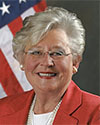 Kay Ivey* (R-AL) |
|
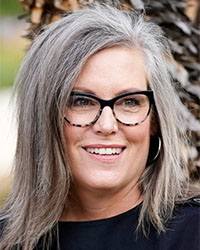 Katie Hobbs (D-AZ) |
 Kari Lake (R-AZ) |
|
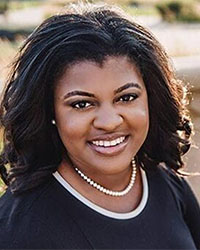 Deidre DeJear (D-IA) |
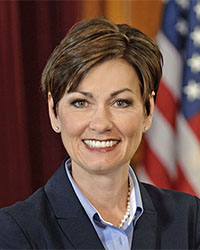 Kim Reynolds* (R-IA) |
|
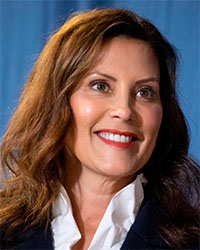 Gretchen Whitmer* (D-MI) |
 Tudor Dixon (R-MI) |
|
 Tina Kotek (D-OR) |
 Christine Drazan |
In Alabama, incumbent Kay Ivey is going to coast to an easy reelection. Yolanda Flowers has worked in Alabama schools for many years in a variety of positions. After this election, she will still be working in the schools. It won't even be close.
Arizona is the state where it is likely to be closest. It is an open seat because Gov. Doug Ducey (R) is term-limited. Arizona is a reddish purple, but Lake is so far out of step with the mainstream, even in Arizona, she could lose. The more Donald Trump comes to campaign for her, the worse it could get. Polling puts Hobbs a couple of points ahead of Lake, but it is very close.
Iowa will be a blow-out for incumbent Kim Reynolds. Yolanda Flowers will get at least 27% of the vote in Alabama because 27% of the population is Black. In Iowa, that number is 4%. DeJear will get a lot more than 4% because many white Democrats will vote for her. Biden got 45% in 2020, so DeJear probably has a ceiling of 45%. But Reynolds will win easily, probably by double digits.
In Michigan, incumbent Democratic governor Gretchen Whitmer is facing a super-Trumpy Republican in Tudor Dixon. Michigan isn't really the kind of place very Trumpy Republicans win statewide races. Whitmer is the favorite here, and is leading by double digits in the polls.
In Oregon, Gov. Kate Brown (D-OR) is term-limited. Nine people are on the ballot, four of them independents. Still, the winner is virtually certain to be either Tina Kotek, the former speaker of the Oregon House, or Christine Drazan, the former minority leader of the state House. The only complication is Democrat Betsy Johnson, who is running as an independent and who could take votes from Kotek. As a result, it could be close, although Oregon is very blue. None of the other candidates has a chance.
As to the second list, in each of those races one of the parties is running a woman but her opponent is a man. In Maine, New Mexico, New York, and South Dakota, the incumbent is a woman. All are expected to win, as is Maura Healey (D) in Massachusetts. So most likely, at least 10 states will have a woman as governor in January, maybe even a few more. (V)
Children's Books Are Now Part of the Culture Wars
Progressive authors have long been writing children's books that are blatantly political. Think about Heather Has Two Mommies and Téo's Tutu, which is about a boy who wears a tutu and wants to be a ballerina. Families can come in all kinds of configurations and contain diverse people. Now a new Texas-based publisher, Brave Books, wants to fight back by publishing thinly veiled right-wing books for children, so conservative parents, libraries, and schools will be able to get young minds thinking in the "right" direction.
For example, former NRA spokeswomen Dana Loesch has co-authored a book called Paws Off My Cannon that describes nasty hyenas that are invading a village using coconut cannons to steal the residents' cupcakes. Village resident Bongo the gorilla wants to shoot back with his coconut cannon, but some of the coconut-control freaks in the village don't like that. But in the end, Bongo pelts the hyenas with his coconut cannon and saves the cupcakes.
Ashley St. Clair wrote a book called Elephants Are Not Birds in which Kevin the Elephant sings as well as a bird. The evil Culture the Vulture tries to convince him that therefore he is a bird. Fortunately, Kevin ultimately ultimately realizes that elephants and birds are different and you can't turn one of them into the other.
Another book, by Trump aide Kash Patel, is called The Plot Against the King. It is about a steel box full of slime. Any resemblance to the Steele dossier is fully intentional. Rep. Dan Crenshaw (R-TX) co-wrote a book about a swan who punishes (cancels) other animals who offend her. Lesser stars have written books challenging abortion, transgender identity, and critical race theory.
While other conservative publishers tend to publish books about patriotism and the like, Brave Books are all right-wing political diatribes using cartoon characters as an antidote to wokeness, so conservative parents can indoctrinate their children early on. The company's website says it "Teaches American values, like":
- Freedom
- Gender reality
- Sanctity of life
- Capitalism
- Canceling "Cancel culture"
- Truth about CRT
- 2nd Amendment
It doesn't pussyfoot around. The books abound in right-wing Christian dogma in brightly colored paperbacks with lovable cartoon characters. Fun for the whole (traditional white Christian nuclear) family. Almost all the books are set in a magical alternative universe on Freedom Island, which is full of talking animals spouting conservative buzzwords. Each book also has an afterword for parents telling them which points to hammer home and how to do it. For example, after reading Paws Off My Cannon, parents are told to steal cupcakes from their children and have them fight back by throwing wadded-up balls of paper at the parents, to make the point that you need an AR-15 to stop cupcake theft.
These books are already causing problems for librarians, some of whom think they belong in adult political satire, not the children's department. This may force them to withhold the lefty books, which may be the ultimate goal of all of this. Or, at very least, would be regarded as a "win" by the right. (V)
Miriam Adelson Is Not As Political As Her Late Husband
Sheldon Adelson was a prolific donor to Republican candidates. In the 2020 election cycle alone, he dropped a cool $420 million on their various campaigns. From 2009 to 2020, he and his wife, Miriam, spent $520 million just on federal races. He died in Jan. 2021 at 87.
His wife, the Israeli-born physician Miriam Adelson, is much less interested in U.S. politics, although she is passionate about Israel. Since Sheldon's death, she has made only two political contributions. One was $5 million to the Congressional Leadership Fund, a super PAC that aims at electing Republicans to the House. This is one-sixth of what her husband gave to that super PAC in 2018. The other donation was $5,000 to Nikki Haley's PAC.
Dr. Adelson also avoids attending top-of-the-line events where politicians go after the big donors. Part of the reason could be that her wealth, which is mostly stock in casinos, has dropped during the pandemic, since casino-going was largely curtailed. But it could also be that she is simply not as devoted to electing Republicans as her husband was. He will be sorely missed—by Republican candidates and PACs. (V)
Massachusetts Will Hold a Boring Primary Tomorrow
There is no Senate race in Massachusetts this year, but there will be a race for the open seat Gov. Charlie Baker (R-MA) is leaving behind. The Democrats will formally nominate AG Maura Healey tomorrow and the Republicans will nominate Trumper Geoff Diehl. In November, Healey will crush Diehl. Not much fun here for political junkies. (V)
The U.K. Will Conclude a Not-Boring Election Today
Today is the day that U.K. PM Boris Johnson reaches the end of the line. Done in by his propensity for hypocritical and rule-bending behavior, the person Conservative Party members have chosen as BoJo's successor will be announced today. Then, he will head to Balmoral Castle, where Queen Elizabeth II is currently in residence (and is disinclined to make the trip back to London), and will formally tender his resignation. She's not supposed to let it be known how she feels about political matters, but our guess is that she will have a hard time not smiling.
We're not experts on British politics, but we have a report from reader A.B. in Lichfield, England, UK, who is, so we will defer to them. Take it away, A.B.:
We'll know the results of the contest to replace Boris Johnson as U.K. Prime Minister today, and the new PM will be installed tomorrow. The contest has had some parallels to the US primary system that may be of interest to your readers.
The contest began when the Conservative Party's MPs whittled down the eight initial leadership candidates to just two via a series of internal votes by the MPs. This left us with former Chancellor of the Exchequer (Treasury Minister) Rishi Sunak, whose resignation from his cabinet post was one of the triggers for Boris Johnson being forced to step down, and current Foreign Secretary Liz Truss, who did not resign. Sunak and Truss were then put forward to an election of all Conservative Party members; technically the vote is only to choose the next Leader of the Conservative Party, who will then be appointed Prime Minister on the basis that the party has a majority in the House of Commons. The new PM could lead the country without holding a national general election until January 2025, and given how unpopular the Conservative Party currently is, it seems unlikely that either candidate would risk a general election unless polling changes significantly.
Sunak campaigned on the basis of his experience as Chancellor and his role in shepherding the British economy through the worst of the COVID crisis; he argued that tax cuts could only come after inflation was brought under control. He had the most support from Conservative MPs, and polls showed he was the most popular of the candidates with the general public. But a perception that he caused Johnson's downfall, and revelations that his billionaire wife was non-domiciled in the U.K. for tax purposes while Sunak held a US Green Card until 2021, all seem to have counted against him.
Truss, in contrast, has been laser-focused on winning the internal Conservative Party members' vote, campaigning heavily on a strongly right-wing program of immediate tax cuts to boost the economy, with her supporters openly using "supply side" language that wouldn't have been out of place in a Ronald Reagan campaign. Her worst wobble was when the only economist that she could name as supporting her policies then cheerfully sat for interviews saying the natural consequence of these policies would be to return interest rates to a "normal" level of around 7%. Otherwise, she often comes across as an ambitious political chameleon, for example backing "Remain" in the Brexit referendum but now positioning herself as the "true" Brexit candidate (to the open frustration of Sunak, who campaigned for "Leave" in the referendum).
Though the opaque nature of the electorate makes a definitive prediction tricky, it seems highly likely that Truss has judged that electorate better, and will be appointed Prime Minister on Tuesday. The party membership is disproportionately male, over 55, white, and based in the southeast of England. Truss has campaigned narrowly to win those voters, while Sunak initially seemed to want to pitch his campaign more broadly; he's spent much of the rest of his time catching up. Giving party members such a significant role in electing the leader is a fairly new system in the UK, only really arising this century. Prior to that, the two main national parties were fond of smoke-filled rooms, internal MP votes, and/or complex mixed electorate systems. Given the new party vote systems seem to encourage candidates to appeal to the party base rather than a national electorate (a phenomenon that American voters will no doubt be familiar with), and in the 2019 election the two main party leaders were a populist right-winger (Boris Johnson) and a populist socialist who led his party to its worst election result since the 1930s (Jeremy Corbyn), both of whom seemed to be buoyed by internal party cults of personality, it's open to question how successful the system has proven to be. Whether this has any lessons for U.S. politics is perhaps best left to our American friends to judge.
And Boris Johnson? He's gone out of his way to do as little as possible since announcing his resignation—a photo-op in Kyiv for Ukrainian Independence Day aside—with the government left barely functioning as fuel prices skyrocket, inflation heads towards a predicted high of 18%, and all sides of politics agree that we're entering a major cost-of-living crisis. Which does rather make one wonder why either Truss or Sunak would want to be PM in the first place, given the poisoned legacy they're inheriting.
Thanks, A.B.! We hope to have another piece tomorrow, from a different British reader, once the announcement is made. (Z)
Previous | Next
Back to the main page